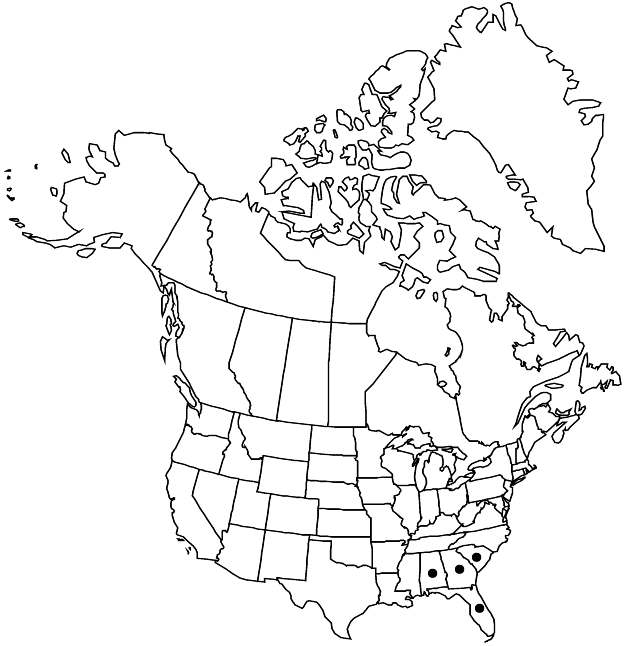Difference between revisions of "Paronychia americana"
Repert. Bot. Syst. 1: 262. 1842.
FNA>Volume Importer |
FNA>Volume Importer |
||
| Line 8: | Line 8: | ||
}} | }} | ||
|common_names=American nailwort | |common_names=American nailwort | ||
| − | |basionyms={{Treatment/ID/ | + | |basionyms={{Treatment/ID/Basionym |
|name=Herniaria americana | |name=Herniaria americana | ||
|authority=Nuttall | |authority=Nuttall | ||
| + | |publication_title=Amer. J. Sci. Arts | ||
| + | |publication_place=5: 291. 1822 | ||
}} | }} | ||
|synonyms={{Treatment/ID/Synonym | |synonyms={{Treatment/ID/Synonym | ||
| Line 36: | Line 38: | ||
|elevation=0-300 m | |elevation=0-300 m | ||
|distribution=Ala.;Fla.;Ga.;S.C. | |distribution=Ala.;Fla.;Ga.;S.C. | ||
| − | |discussion=<p>Plants of <i>Paronychia americana</i> with fewer flowers in lax cymes from Florida and Georgia were named <i></i>subsp.<i> pauciflora</i>, a distinction that we do not feel is worth recognition.</p> | + | |discussion=<p>Plants of <i>Paronychia americana</i> with fewer flowers in lax cymes from Florida and Georgia were named <i></i></i>subsp.<i><i> pauciflora</i>, a distinction that we do not feel is worth recognition.</p> |
|tables= | |tables= | ||
|references= | |references= | ||
| Line 60: | Line 62: | ||
|publication year=1842 | |publication year=1842 | ||
|special status= | |special status= | ||
| − | |source xml=https://jpend@bitbucket.org/aafc-mbb/fna-data-curation.git/src/ | + | |source xml=https://jpend@bitbucket.org/aafc-mbb/fna-data-curation.git/src/f6b125a955440c0872999024f038d74684f65921/coarse_grained_fna_xml/V5/V5_54.xml |
|subfamily=Caryophyllaceae subfam. Paronychioideae | |subfamily=Caryophyllaceae subfam. Paronychioideae | ||
|genus=Paronychia | |genus=Paronychia | ||
Revision as of 20:09, 24 September 2019
Plants annual or biennial; taproot slender. Stems erect or ascending to prostrate, branched, 5–60 cm, often retrorsely pubescent on 1 side. Leaves: stipules ovate-lanceolate, 1.5–7 mm, apex acuminate, fimbriate; blade spatulate to oblanceolate or linear-oblanceolate, 3–20 × 1–4 mm, herbaceous, apex acute to obtuse or rounded, glabrous to scaberulous. Cymes terminal, 9–25-flowered, ± compact, forming spheroid glomerules 2–6 mm wide. Flowers 5-merous, ± short-cylindric, with slightly enlarged hypanthium and calyx widening somewhat distally, 1–1.8 mm, sparsely to moderately pubescent proximally with hooked to straight hairs; sepals red-brown (sometimes finely striped or mottled), white distally, midrib obscure, obovate, 0.4–0.8 mm, leathery to rigid, margins white, 0.03–0.1 mm wide, thinly herbaceous, apex broadly rounded, hood broadly rounded, awn or mucro usually absent or minute; staminodes narrowly triangular, 0.3–0.4 mm; style 1, cleft in distal 1/6, 0.6–0.8 mm. Utricles ovoid to ellipsoid, 0.6–0.8 mm, smooth, glabrous.
Phenology: Flowering year round.
Habitat: Dunes, pine/oak woodland, fields, clearings, roadsides
Elevation: 0-300 m
Distribution

Ala., Fla., Ga., S.C.
Discussion
Plants of Paronychia americana with fewer flowers in lax cymes from Florida and Georgia were named subsp. pauciflora, a distinction that we do not feel is worth recognition.
Selected References
None.